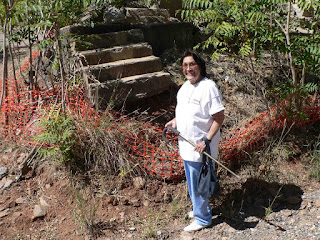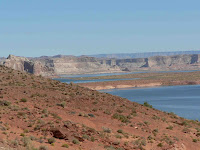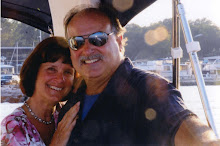Last stop, Sedona, Arizona. It’s hard to believe that this trip is almost over. Sedona is one of my favorite places. Actually almost all of our stops have been added as a favorite.
We celebrated our first night at our last stop with a Margarita Munchie Party and a beautiful sunset.

Our campground had wonderful facilities. Our first morning, we had a busy schedule, with an early bus pick up.
We headed off to the beautiful town of Sedona, where we saw the Bell Tower

As well as Submarine Rock and Cathedral Rock on our way to Oak Creek Canyon. As we passed Slip Rock State Park, there was an apple festival in full force. Slip Rock Park, a natural water park, is one of the biggest attractions in Sedonna. Oak Creek runs through it and people can float down with the current over the rocks, like a slip and slide.
At the Oak Creek Canyon Overlook we were able to enjoy the view as well as check out the Native American’s selling their jewelry and artwork.


On our way back to town, we stopped at a “water hole” where people come from all over to fill up jugs of water. It’s spring water from the creek and boy is it good! While there, one guy was filling up three 5 gallon jugs to take home.

We drove up to the airport mesa overlook, but traffic was so bad because of a car show that we didn’t have time to get out and take pictures, but the view was great.
 We made it to the once booming copper mining town of Jerome in time for lunch. It was the largest copper mine in Arizona, producing 3 million pounds of copper per month! Jerome, founded in 1876, once the fourth largest city in the Arizona Territory, is now considered a ghost town with a little over 300 population, whereas in 1920s they had 15,000 and dropping to less than 5,000 in the 1930s. The estate of the owner of the copper mine is run by the state but tours have been suspended because of funding.
We made it to the once booming copper mining town of Jerome in time for lunch. It was the largest copper mine in Arizona, producing 3 million pounds of copper per month! Jerome, founded in 1876, once the fourth largest city in the Arizona Territory, is now considered a ghost town with a little over 300 population, whereas in 1920s they had 15,000 and dropping to less than 5,000 in the 1930s. The estate of the owner of the copper mine is run by the state but tours have been suspended because of funding.

We heard the “Haunted Hamburger” restaurant was the best, so we all ate their for lunch. The food and service were good, and the portions were huge. It is said that the dwelling has a resident ghost and has been featured on Ghosthunters. We, however, didn’t get to experience the ghost, much to Bill’s dismay. (He’s just dying to experience a ghost!)
Jerome is a really unique town. It is so full of history and memories, which I’ll talk about later, for so many people. A walk up and down Main Street will find you in a lot of unique shops.

We then toured the Tuzigood Indian Ruins, Montezuma Castle, and museum. As we walked up to the ruins (Tuzigood), it was dejevue for Bill and I. In 1985 we visited the ruins with Robby. Tuzigoot (Apache for “crooked water”) is the remnant of a Southern Sinagua village built between 1125 and 1400. It crowns the summit of a long ridge that rises 120 feet above the Verde Valley. The original pueblo was 2 stories high in places, with 77 ground-floor rooms.
Southern Sinagua farmers began building this five-story, 20 room dwelling early in the 1100s. It stands in a cliff recess 100 feet above the valley.


The limestone at Montezuma Castle is fairly soft and splits unevenly. Yet the Castle was so well built that it has stood for over 600 years and is one of the best-preserved prehistoric structures in the Southwest.

Tuzigood and Montezuma Castle villages reached their maximum size in the 1300s and were occupied for another century. No one knows why they abandoned their pueblos by the early 1400s.
Our son, Robby, flew in that evening so that he could enjoy our free day and the drive back home with us. What a beautiful sunset on our way to the Phoenix Airport.

On our free day, Bill, Bobby, Marcia and a few guests took a motorcycle ride. Robby and I headed to Sedona,
stopping at the V-V Petroglyph Site, which consisted of 3 HUGE rocks full of petroglyphs. There were more petroglyphs on these rocks than we have seen in all the trips combined this summer. These were a little different though. The drawings all seemed to be connected. I think the author was writing in cursive.


We also stopped at the Chapel of the Holy Cross, built in 1956, known for the unique architecture, which was considered quite bold and daring in the 1950s. Just across the street from the chapel is this HUGE estate, so of course we took a lot of photos of it.
We later found that we think it may be owned by Nicholas Cage, but no one is really sure. They have been building it for 4 years, it still is not complete and has been for sale for the last 2 years. So if you are in the market for a nice house in Sedona, let me know and I’ll send you the address.
On our way out of Sedona, Robby’s observant eye caught a unique looking truck, so we stopped to take a picture. We found out it was used in the movie,“Chitty, Chitty, Bang, Bang.”

Our farewell dinner was held at the Cliff Castle Casino Lodge. We had a nice private room and great food. The service could not have been better. At our farewell dinners, each couple is responsible for telling the funniest and most memorable story from the trip. We always enjoy hearing what everyone has to say and most of the time, a lot of things, which have been forgotten are remembered. We were surprised that the almost all of the guests enjoyed 2 of the optional events, the river raft trip and the murder mystery dinner. We never know if the majority of the guests will enjoy the optional suggestions that we propose, so it’s so nice when our choices are a success.
We held our hitch up breakfast the next morning so that we could say our goodbyes and send them off with a well rounded meal. Boy the goodbyes are difficult. Every group is special, but because this was a small group, it seemed that we were able to get to know everyone much better. This trip was also special to Bill and I because we had 2 couples that we had traveled with last year and it was like a reunion. We enjoyed them even more on this trip and we look forward to traveling again with them in the future. We also hope to travel with the other guests sometime in the future and to be able to get together within the next year with those who live on the East Coast.
Bobby, Marcia, Bill, Robby and I enjoyed a great Mexican dinner and sunset as we reminisced about all our trips.


Our final day in the Verde Valley was spent back in the town of Jerome. Once again, we were so lucky to run into one of the locals, Rosalie Palacios (age 88), who was born in Jerome and was back visiting and reminiscing with her cousin who also was born in Jerome. We first met her at one of the shops and then later found her looking at one of the older houses, which we thought was her grandmother’s, but found out it was the bordello that was across the street from her grandmothers.
She told us of the mine collapse which destroyed some of the town, including her grandmother’s house. It was a great feeling to watch as she looked on to where the steps of her grandmother’s house still stand remembering how her grandmother used to sit on the steps.
She had a 3 bedroom house and raised I think it was 15 kids. She talked about how hard she worked running a boarding house. Next door was the bowling alley, across the street was the swimming pool, and up the street was a grocery store. The family that owned the store lived upstairs, where you see the 3 big windows. What a view they must have had.

In 1936 an enormous charge of dynamite (260,000 pounds) was set off – equal to 6 freight car loads – and the surface began to shift. Tunnels under the town, some as deep as 4,800 feet below the surface, began to crack. The shifting, combined with the 30 degree incline of the mountainside, pulled a number of buildings down the slope, and entire sections of the business district collapsed or slid downhill. Jerome’s famous “Sliding Jail” moved downhill 225 feet and sat in the middle of Hull Avenue until a bulldozer moved it to its final resting place across the road from its original site, with one of the beds still intact. There are still 88 miles of tunnels under the town, and there are four geological faults in the area.


Rosalie told us that her grandmother spent the night in the jail one time and when asked why, she told us that she used to grow beautiful pots of plants. Not only did she think her plants were pretty, but she used them for medicecal purposes. Well, it turned out that those beautiful plants were marijuana, unbeknownst to her.
She also pointed out what the call the “ammo house,” which is a building made from dynamite cases from the mining operations. It started out as a church, then someone bought it as a residence, and now I believe it is empty.

We found that this town used to thrive on prostitution because there were so many single men who worked in the mines. Rosalie said that Jerome was a very happy, happy city. As we walked up past the shops, we stumbled across “husband alley.” This was the back entrance of the “cribs” so that the patrons could come and go without being noticed. The girls who worked in the “cribs” were one step above a “street walker.” Below is what the cribs looked like.

We visited the Mining Museum, which was very interesting and gave us a lot of history about the town. There was even a Chinese washing machine.


Crank and gear mechanisms were used to agitate and spin the laundry.
As we drove out of town, we passed the Jerome Grand Hotel. The building was built in 1926 as a hospital and operated until 1950. The building was vacant for almost 45 years and opened as the Grand Hotel in 1996. At a one mile elevation, the panoramic views of the Verde Valley and Sedona Red Rocks are breathtaking.
Tomorrow, it’s time for Bill, Robby, and me to head back east, leaving our dear friends, Bobby and Marcia.































 Lake Powell is so beautiful, I wish we could have stayed longer.
Lake Powell is so beautiful, I wish we could have stayed longer.